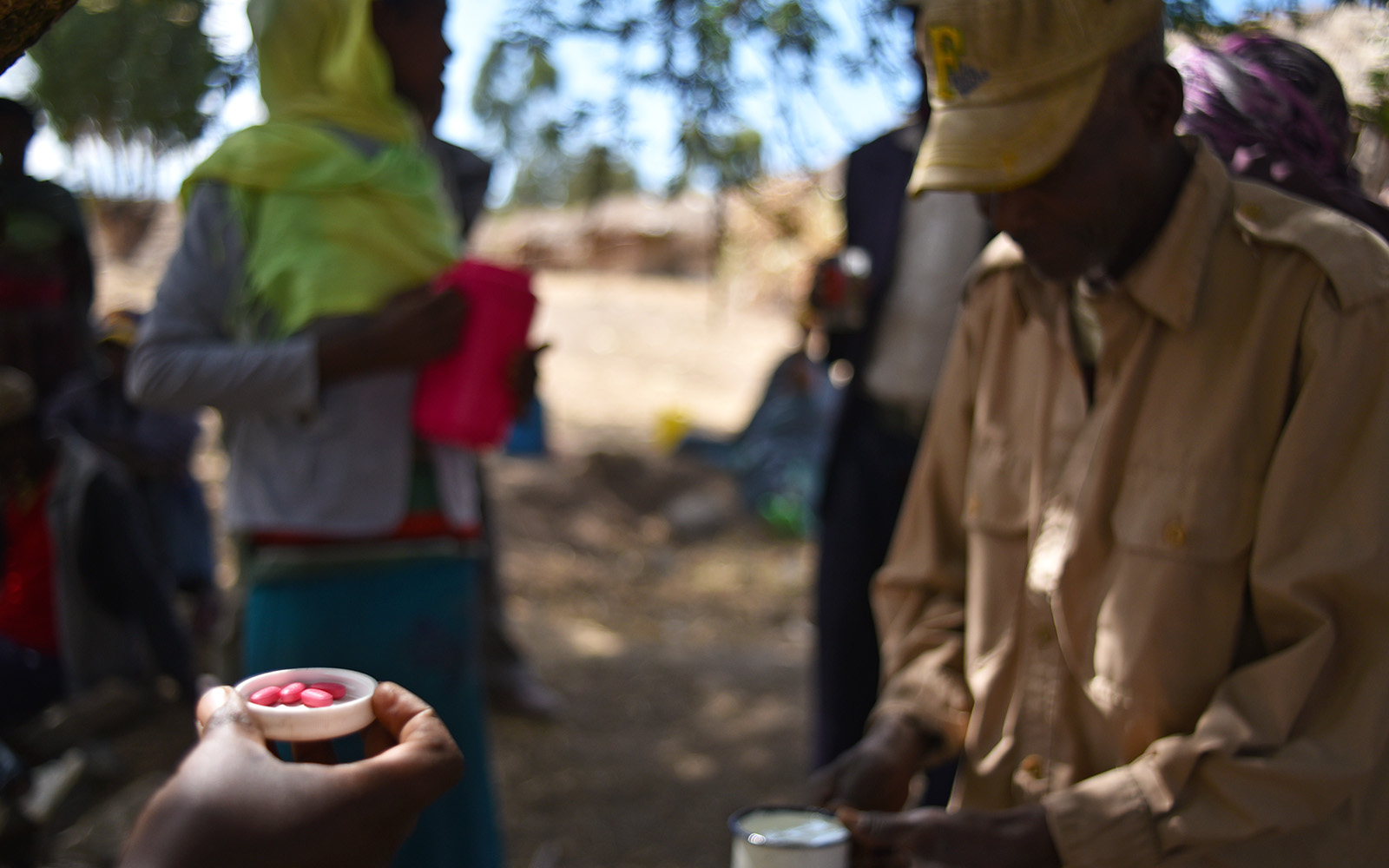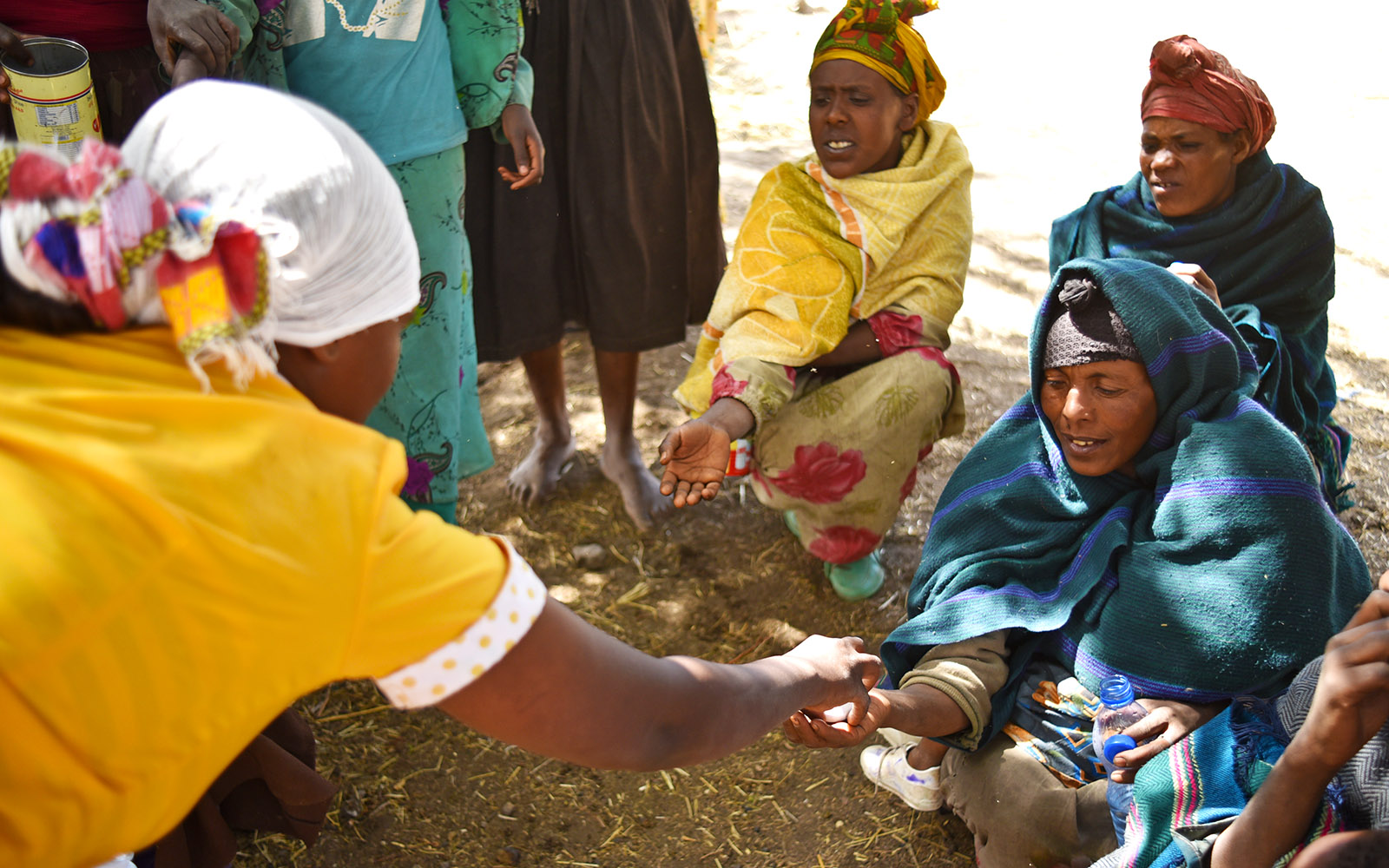The Fred Hollows Foundation applauds Pfizer’s renewed commitment to eliminate trachoma, the world’s leading infectious cause of blindness.
Pfizer, one of the world’s largest pharmaceutical companies, has announced they will extend their donation of the antibiotic Zithromax® for the treatment and prevention of trachoma through to 2025.
Zithromax®, Pfizer’s trade name for azithromycin, is a broad-spectrum antibiotic primarily used to treat respiratory, intestinal and sexually transmitted bacterial infections. But it has proven to be crucial in the treatment and prevention of trachoma.
Pfizer’s commitment continues their long-term support of the global effort to eliminate the disease.
 Health extension worker Dariskar Nadow helps to administer trachoma medication (zithromax) at an MDA (Mass Drug Administration). Photo: Matthew Smeal
Health extension worker Dariskar Nadow helps to administer trachoma medication (zithromax) at an MDA (Mass Drug Administration). Photo: Matthew Smeal
“Trachoma affects the poorest of the poor and traps millions in a cycle of poverty,” said Caroline Roan, Vice President, Corporate Responsibility, Pfizer Inc.
“We are grateful for our partnership with the global health community over the past 20 years, and recognize the importance of our donation in achieving our shared goal of a trachoma-free world. We are excited to extend our donation program through 2025 to help eliminate trachoma from even the most remote communities,” she said.
The Fred Hollows Foundation distributed approximately 18 million doses of Zithromax® in 2017 alone and has distributed upwards of 44 million doses in the past three years.
“We absolutely could not have done this without Pfizer’s generosity,” said The Fred Hollows Foundation’s CEO, Ian Wishart.
“We recently celebrated the elimination of trachoma in Nepal and were part of a mass drug administration program in war-torn Yemen. This clearly shows that concerted efforts by governments, NGOs and partners like Pfizer, can achieve significant goals.”
“The extension of Pfizer’s commitment to donate Zithromax® will make the elimination of trachoma in remaining countries much more realistic and bring relief to many people suffering from this incredibly painful disease,” he said.
 Health extension worker Dariskar Nadow helps to administer trachoma medication (zithromax) at an MDA (Mass Drug Administration). Photo: Matthew Smeal
Health extension worker Dariskar Nadow helps to administer trachoma medication (zithromax) at an MDA (Mass Drug Administration). Photo: Matthew Smeal
Trachoma remains a public health problem in 41 countries where it is responsible for the blindness or vision impairment of nearly 2 million people. Africa is the most affected continent, and Ethiopia in particular.
Dr Wondu Alemayehu is The Fred Hollows Foundation’s technical adviser in Ethiopia. “Trachoma is one of the oldest infectious diseases known to mankind,” he said.
“It is caused by a micro-organism that spreads through contact with eye discharge from the infected person, on towels, fingers, and so on, and through flies that have had contact with an infected eye.”
“After years of repeated infections, the inside of the eyelid may be scarred so severely that the eyelid turns inward – a condition known as trichiasis – and the lashes rub on the eyeball, scarring the cornea, the front of the eye. If untreated, this leads to extremely painful and irreversible blindness,” he said.
 Belaynesh lived with trachoma for four years before receiving treatment. Photo: Matthew Smeal
Belaynesh lived with trachoma for four years before receiving treatment. Photo: Matthew Smeal
As many as 229 million people live in trachoma endemic areas globally. Despite this, trachoma remains a neglected tropical disease (NTD).
“It is an NTD because it's largely a silent disease in its acute and active stages and its blinding, painful and detrimental end stage disproportionately affects women and mothers living in challenged countries as well as mainly hard to reach areas. There is a huge lack of awareness and gender disparity,” Dr Alemayehu said.
“Furthermore, it's wrongly perceived as a ‘non-killer’ disease by decision makers in many of these countries. The fact that these same countries are faced with other huge competing demands such as tuberculosis, malaria, HIV and so on, is also a formidable challenge, making trachoma a 'neglected tropical disease' despite its enormous detrimental consequences on individuals, their families, communities and countries at large,” he said.
Antibiotics like Zithromax® make up one of the four components of the WHO recommended SAFE strategy to eliminate trachoma: surgery, antibiotics, facial cleanliness, and environmental improvement.
See more about: